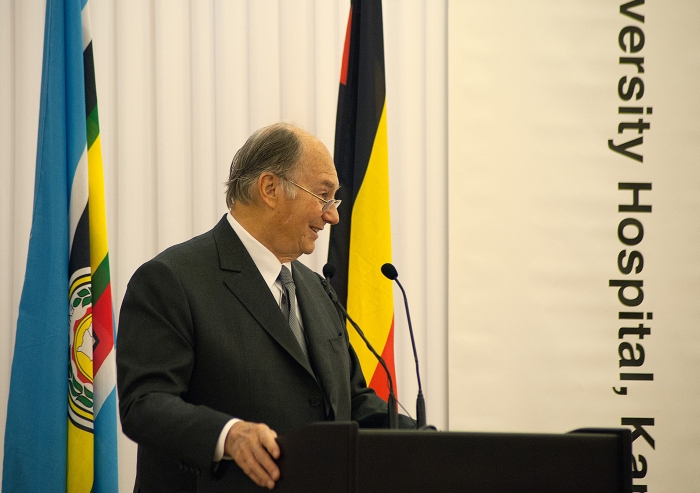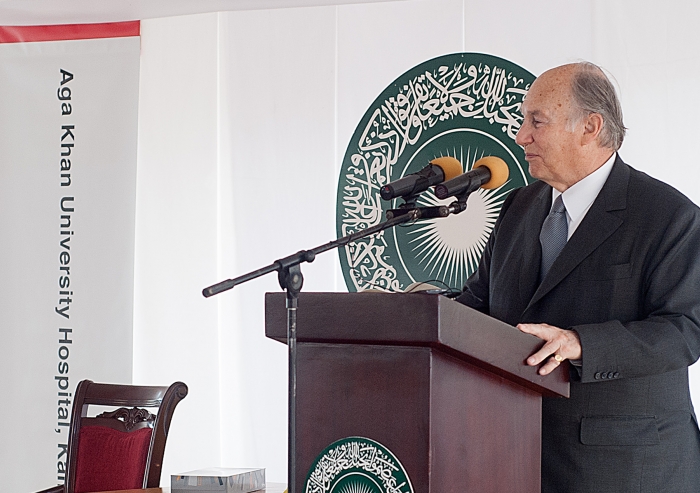Banquet hosted in honour of President Museveni
Your Excellency the President of the Republic of Uganda and the First Lady
Your Excellency the President of the Central African Republic and the First Lady
Your Excellency President Chissano, former President of Mozambique and UN Secretary-General’s Special Envoy
Your Excellency the Vice President
Right Honourable Speaker
Her Lordship the Deputy Chief Justice
Right Honourable Prime Minister
Your Worship the Mayor of Kampala
Honourable Ministers
Excellencies
Distinguished Guests
This is a special evening for me - the closing moments of the first of my Golden Jubilee visits to places which have had particular meaning for the Ismaili Community, for the institutions of the Aga Khan Development Network, and for me, personally, over the past half century.
A Jubilee celebration is a time for reflection. And it is also a time to look ahead.
As I look back to my early years of my Imamat, I would note that I came to this position at the very moment when the developing world was first emerging as an important, independent voice in world affairs. The late 1950’s and the early 1960’s marked the end of the colonial era in most of the developing world. It was a time of enormous hope - but also of fearful challenge. I remember thinking to myself that, at no time in human history had so many nations achieved independence - and introduced new systems of government - in such a short period of time. I remember the sense of awe I felt - indeed of diffidence - close to a sense of vertigo - when I asked myself how so many poor states would create the political structures - or find the human and material resources, which would give real meaning to their independence.
In Uganda, it was also a time of special hope - but also one of special challenge.
I describe those memories tonight not out of any sentimental nostalgia for the past - for a time when both my Imamat and the era of African independence both seemed so very young. No - I mention these memories because I continue to feel so deeply about Africa’s enormous potential. These feelings, in fact, have come to form what I would describe as a core conviction.
My optimism grows out of several observations: beginning with the continuing rich potential of Africa’s natural resources - including the remarkable talents and the resilient spirit of its peoples. I would also note the progress which has been made in the economic field, as exemplified by the recent growth rates in Uganda. I am encouraged by the welcoming attitude which has developed in Uganda, and elsewhere across the Continent, for private investment and for public/private partnerships. I would mention also, especially in the Ugandan context, the growing potential for cross-border cooperation, including Uganda’s role in international institutions - from the East African Community to the British Commonwealth.
In discussing economic progress, I especially want to note the strong commitment which has been made to improving the quality of life in the great rural areas of this country, places where both the opportunities and the difficulties, the hopes and the hurdles, are particularly high. Yet - here in Uganda, as in the other countries I have recently visited, I see an intensified determination to overcome those obstacles - and to deliver practical results.
I had the honour yesterday of joining President Musevini in laying the foundation stone for one of the largest power projects in African history, a great hydroelectric facility at Bujagali. That project has been a dream in Uganda for many years. When that dream was renewed more recently, the Aga Khan Fund for Economic Development took on the leading role - acting as a catalyst for a wide array of public and private partners. It was an impressive experience - not only because it showed the depth and breadth of support for Africa’s future, but also because of the Uganda government’s determination to clear the path for this project, in innovative and effective ways. The result was that our ceremony yesterday came less than two years after we became officially involved - a remarkably short time as these things go - reflecting a healthy sense of urgency.
There are other reasons, too, for my positive outlook. One of the most important is a growing spirit of pluralism - which is especially vibrant here in Uganda, growing out of this country’s rich diversity - of language, of ethnicity, of faith, and even of social philosophy. It is a diversity which is mirrored in the diversity of the Ismaili Jamat and the whole of the Islamic Ummah in Uganda. This rich diversity is also reflected, I am pleased to note, in the makeup of our gathering this evening.
My hope for Uganda is that it can continue to build a culture which sees diversity and difference, peacefully expressed, as a source of potential strength rather than a cause of harmful division. Even as we take deep pride in our own personal traditions - we also know that we can learn a great deal from those who have come from different backgrounds and who hold different perspectives.
As this resurgent cosmopolitan spirit continues to develop in Uganda, it can be a profound source of strength for this country - and indeed for the entire world.
All across our planet in these early years of the 21st century, people are learning to live with other people who are different from them - but who are suddenly and closely connected. This is happening because of the radical technological revolution in the way the world communicates - and also because of the unprecedented movement of populations from region to region. In such a world, our new neighbours are those who may live across the world as well as those who may live across the street.
I believe the people of Uganda can give to the world, in the years ahead, the gift of a vibrant example – as a society which has overcome the worst experiences of past intolerance and embraced the abundant promise of a pluralistic but united future.
If one key to unlocking the potential of Uganda, and of all of Africa, is a spirit of pluralism, then another key should be a commitment to excellence. There was a time, earlier in my Imamat, when mediocrity was considered tolerable here because it was “good enough for Africa”. I remember my apprehension at the time, my concern that among all the goals that were set for Africa in those days, the achievement of normal world-class standards was not seen as realistic. But in the rapidly globalizing world of the 21st century, the progress of every country and continent will depend on its ability to meet universal standards. To settle for less is an increasingly dangerous decision.
This commitment to achieve global norms, and even to excel, can wisely begin with a nation’s educational institutions - and the preparation of our future leaders. Here Uganda’s proud traditions - at Makerere University - and other great institutions - should be of special motivation and strength.
As you know, a number of the new initiatives which I have announced on behalf of the Aga Khan Development Network this past week have been in the educational area.
When we invest in education we are investing in people - and no investment can pay greater dividends. This is why the Aga Khan University - building on its successes in Pakistan - and in eight other countries where it now has teaching sites - is determined to establish a major new presence in East Africa. We announced just the other evening a plan for creating this campus in Arusha – a central point from which it will be able to serve the entire region - as a true center of international excellence.
A few days earlier, we announced the creation of a new Faculty of Health Sciences, based at the Aga Khan University in Nairobi. And earlier today we announced plans for an Aga Khan Academy campus here in Kampala - to train teachers and developing students for leadership positions. In all of these efforts, we see ourselves as partners with the people of East Africa.
It is in that spirit of partnership, then, that I conclude this journey, grateful for what we have been able to do together in the past, excited by the things we will be attempting to do together in the future, and looking forward to many return visits to this very special place.
Thank you.







